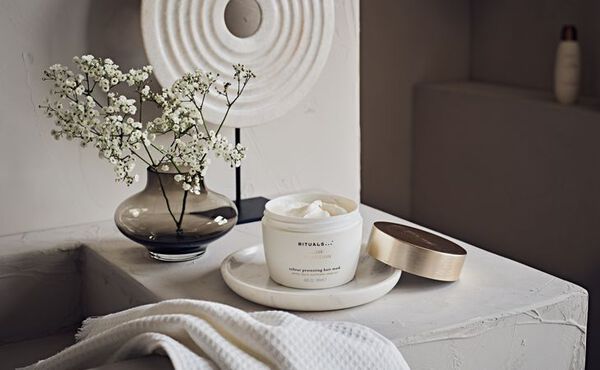Your scalp is the foundation of healthy hair, yet it’s often overlooked. Until now – read our expert guide to everything you need to know about keeping your scalp healthy.
Strong, shiny, healthy hair is something many of us strive for, but without a healthy scalp at the root of it all, it’s a haircare goal that may stay just out of reach. While our strands get all the focus, not to mention the skin on our faces and the rest of our body, scalp health is too often overlooked. Until there’s a problem, of course.
An itchy, flaky, or sore scalp is often a tell-tale sign that something has gone amiss – but what should you do to prevent scalp issues from cropping up in the first place? We’ve gone straight to the experts with this one.
So, whether you’re wondering how to treat a dry scalp, what’s making it so itchy, or just how to keep your scalp in tip top condition, keep on reading for everything you need to know.
WHAT DOES A HEALTHY SCALP LOOK LIKE?
If you’ve a preference for longer hair, then it can be tricky to assess how well your scalp is actually doing beneath all that hair. But generally, a scalp that’s in good condition should feel comfortable – neither too dry nor excessively oily. Healthy hair growth is also a sign that things are looking good. “A healthy scalp is clean and free from excessive oil, dirt, and product build-up,” says superintendent pharmacist, Abbas Kanani “It shouldn’t cause you any discomfort, such as itching, burning, or tenderness.” Which leads us on to…
WHAT ARE THE SIGNS OF AN UNHEALTHY SCALP?
Itchiness, irritation and dandruff can all be signs that your scalp needs a bit of attention and TLC. The same goes for excessive hair loss, thinning or slow growth, says Kanani. “These symptoms may signal an issue with the production of natural oils, inadequate blood circulation or poor hair hygiene,” he explains.
“Conditions such as scalp acne, folliculitis and psoriasis which can cause inflammation may also disrupt scalp health.” If you think you may be experiencing one of these conditions, it’s a good idea to consult your GP or visit a pharmacist for some advice, likewise, says Kanani, if you notice any persistent odours, which could be a sign of bacterial growth.

HOW TO TREAT… A DRY OR SORE SCALP
That tight skin feeling is never pleasant, so try these expert tips from Kanani to tackle a scalp that’s feeling on the dry side.
- Look to hydrating shampoos to help nourish your hair and scalp while cleansing – avoiding harsh sulphates will help too.
- Overwashing can strip your hair and scalp of natural oils, exacerbating dryness, so try reducing how often you shampoo.
- Enjoy a steamy shower? Hot water can also worsen dry skin, so opt for cool or lukewarm water when washing your hair to help maintain moisture.
- A humidifier can add moisture to the air in your home and, in turn, help to prevent excessive scalp dryness.
HOW TO TREAT… AN ITCHY OR IRRITATED SCALP
First up, try to resist the urge to scratch, says Kanani. It can lead to skin damage, inflammation, and ultimately make things worse. Instead, try these tips to address the underlying cause.
- If dandruff or seborrheic dermatitis is the cause of your itch, using medicated shampoos can be beneficial. They’ll reduce the itch and can help control dandruff, too.
- Apply a small amount of a gentle, moisturising conditioner or natural oils like coconut oil or tea tree oil to your scalp for relief. Leave it on for a short time before rinsing off.
- Consider switching to milder, fragrance-free and hypoallergenic hair products until the irritation has subsided – test them on a small area of your scalp first.
HOW TO TREAT… DANDRUFF OR FLAKY SCALP
Persistent white flakes can be annoying and are a key sign that your scalp needs some care and attention. Try these tips from Kanani to regain control.
- Stress has been linked to various skin conditions, including dandruff. Exercise, meditation and breathwork can all help to reduce stress, and potentially improve the health of your scalp.
- Look to anti-dandruff shampoos containing active ingredients, which can help to reduce flaking.
- Gently massaging your scalp with your fingertips while shampooing can help loosen and remove flakes – just avoid using your nails, which can cause further irritation or damage. You could also try our scalp scrub to slough away flakes.
- Try to avoid over washing your hair – it can strip the scalp of its natural oils, worsening any dryness, dandruff and flakiness.
3 WAYS TO KEEP YOUR SCALP HEALTHY
- Feed your skin with foods that are rich in vitamins, minerals, and omega-3 fatty acids, such as fruits, vegetables, whole grains, fish, nuts, and seeds. Need some inspiration? We’ve got plenty of delicious, nutrient-rich recipes for you to try.
- Keep your hair and scalp clean by washing regularly with a shampoo and conditioner that’s suited to your hair and skin type. With our personalised haircare range, that’s easier than ever.
- Good blood circulation is crucial for delivering oxygen and essential nutrients to your scalp and hair follicles. Keep yours pumping with regular exercise, hair brushing, and gentle scalp massage. Add the Elixir Collection scalp scrub to your massage for a purifying cleanse.
-
View full details€12,90
-
View full details€12,90







.jpg?sw=600&sh=370&sm=fit&cx=0&cy=0&cw=1873&ch=1155&sfrm=png)



